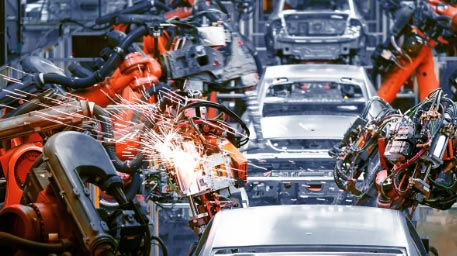
A revolution is underway in the North West of England.
Quietly, decisively, the region is positioning itself as the undisputed leader of the UK’s hydrogen economy. This industrial transformation is set to create tens of thousands of skilled jobs and inject billions into the local economy.
This isn’t a distant ambition; it’s happening right now.
For engineers, project managers, and technical specialists, this represents the most significant career opportunity of a generation. To be a part of it, you need the right skills.
Why the North West is the UK's Hydrogen Powerhouse
So, what makes the North West the epicentre of this movement? It’s a powerful combination of strategic location, industrial heritage, and landmark investment.
The region is home to HyNet North West, one of the UK's flagship low-carbon projects. In simple terms, HyNet is developing the infrastructure to produce vast quantities of 'blue' hydrogen. This process converts natural gas into hydrogen while the carbon is captured and stored safely offshore.
The opportunity isn’t limited to one project. The North West is creating a comprehensive hydrogen ecosystem. Alongside HyNet, a growing 'green' hydrogen sector is emerging, focused on producing hydrogen from renewable energy sources.
This dual-track approach makes the region's hydrogen economy uniquely resilient and diverse. It provides a clear, long-term roadmap for decarbonising industry and securing the UK’s energy future. For the region's technical workforce, this isn't just another project; it's the foundation of a new industrial era.
The 5 Essential Skills Driving the Hydrogen Transition
The scale of the North West’s hydrogen ambition requires a vast range of technical expertise. While the technology is innovative, the engineering principles are foundational. The most urgent demand is for skilled professionals who can adapt their experience from established sectors like oil & gas, chemical processing, power generation, and large-scale construction.
Based on the project specifications for HyNet and related infrastructure, at Millbank we are seeing a huge demand from our clients for five core skill sets. Below, we break down what they are and how your existing experience fits in.
Process & Chemical Engineering
Why it’s critical: Process engineers are the architects of the hydrogen production lifecycle. They design, optimise, and troubleshoot the systems that produce, purify, and transport hydrogen, whether it's from natural gas (blue) or electrolysis (green).
How your skills transfer: If you have a background in chemical manufacturing, oil & gas refining, or industrial gases, you are already equipped with the core competencies. As the professional body for this discipline, the Institution of Chemical Engineers (IChemE) provides extensive resources on the role of chemical engineering in the energy transition.
- Your experience: Designing and managing high-pressure, high-temperature systems.
- Its application in hydrogen: This is fundamental to Steam Methane Reforming (SMR) or Autothermal Reforming (ATR) processes used in blue hydrogen production.
- Your experience: Conducting safety studies like HAZOP and LOPA.
- Its application in hydrogen: Essential for ensuring the inherent safety of all new hydrogen facilities.
Civil & Structural Engineering
Why it’s critical: The hydrogen economy needs to be built from the ground up. Civil and structural engineers are responsible for the physical foundations of this new industry, from production plants to the pipeline networks.
How your skills transfer: Experience gained on any major industrial infrastructure project is directly applicable. This includes energy-from-waste plants, petrochemical facilities, or large manufacturing sites.
- Your experience: Site preparation, groundworks, and foundation design for heavy industrial equipment.
- Its application in hydrogen: Needed for building the structures that will house reformers, compressors, and carbon capture units.
- Your experience: Designing and assessing reinforced concrete and steel structures.
- Its application in hydrogen: Critical for constructing pipe racks, storage facilities, and processing plant buildings that can withstand industrial demands.
Project & Construction Management
Why it’s critical: Delivering multi-billion-pound energy projects on time and on budget requires elite project and construction management. These professionals are the conductors of the orchestra, coordinating hundreds of contractors, suppliers, and stakeholders.
How your skills transfer: If you have managed complex, high-value EPC (Engineering, Procurement, and Construction) projects in sectors like nuclear, oil & gas, or national infrastructure, you are in extremely high demand.
- Your experience: Managing multidisciplinary engineering teams and overseeing project delivery from FEED to commissioning.
- Its application in hydrogen: This is the exact skill set required to lead the construction of new hydrogen production and carbon capture facilities.
- Your experience: Commercial management, risk mitigation, and complex stakeholder engagement.
- Its application in hydrogen: Essential for navigating the supply chain challenges and regulatory approvals of these first-of-a-kind projects.
Electrical, Control & Instrumentation (EC&I)
Why it’s critical: Modern energy facilities are highly automated and controlled. EC&I engineers design the nervous system of the plant, ensuring it operates safely, efficiently, and reliably.
How your skills transfer: Your background in power generation, manufacturing, or any process-driven industry provides the perfect foundation for a role in the hydrogen sector.
- Your experience: Designing and implementing Distributed Control Systems (DCS) and Safety Instrumented Systems (SIS).
- Its application in hydrogen: Crucial for monitoring and controlling the intricate processes of hydrogen production and carbon capture.
- Your experience: Specification of field instrumentation for pressure, temperature, flow, and level.
- Its application in hydrogen: Vital for gathering the data needed to ensure the plant runs within its safe operating limits.
Health, Safety & Environmental Management (HSE)
Why it’s critical: In a high-hazard industry, a world-class safety culture isn't a goal, it's a prerequisite. HSE professionals are the guardians of the workforce and the environment, ensuring these projects meet the UK's stringent regulatory standards.
How your skills transfer: A track record of implementing safety systems in environments governed by the Control of Major Accident Hazards (COMAH) regulations is the most valuable asset you can have.
- Your experience: Developing and implementing HSE management systems in oil & gas, chemical, or heavy manufacturing.
- Its application in hydrogen: The principles of process safety are directly transferable, especially concerning the management of flammable gases.
- Your experience: Ensuring environmental compliance and managing permits.
- Its application in hydrogen: Key to the success of carbon capture and storage (CCUS) elements, a cornerstone of the North West's strategy.
How to Pivot Your Career into the Hydrogen Sector
The single biggest myth about the hydrogen industry is that you need "hydrogen experience" to get in. This is exactly what stops many highly skilled professionals from even considering a move.
The reality? The sector is brand new. Very few people have direct hydrogen project experience because the large-scale projects simply haven't been built yet.
Hiring managers are not looking for hydrogen experts. They are looking for proven engineering and project management experts from high-hazard, regulated industries. They need your transferable skills. Your challenge isn't a lack of experience; it's learning how to frame the experience you already have.
Here are two steps you can take to position yourself for the opportunity.
Update Your Professional Profile
Start by optimising your CV and LinkedIn profile. The key is to demonstrate a commitment to your own professional development. A fantastic resource is the Energy Institute's 'mycareerpath' tool, which is designed specifically for energy professionals to plan and record their progress towards goals like chartership. Aligning your profile with this kind of professional standard signals serious intent.
Also, ensure you integrate keywords like "hydrogen skills North West" and technical terms such as "EPC," "COMAH," and "process safety" to increase your visibility to specialist recruiters.
Reframe Your Project Experience
The most powerful thing you can do is change how you talk about your past projects. Instead of just listing your responsibilities, frame your achievements in the context of the energy transition. For guidance on articulating your competencies, the IMechE's Continuing Professional Development (CPD) resources offer a robust framework for engineers to reflect on and record their skills in a structured way.
- Instead of saying: "Managed the £50m construction of a chemical processing plant."
- Try saying: "Led the end-to-end delivery of a £50m high-hazard facility, managing multidisciplinary teams to deliver a complex project governed by strict COMAH safety regulations."
This second version uses the language of the hydrogen sector. It highlights your transferable expertise in managing safety, complexity, and scale—which is exactly what these new projects demand. It shows you don't just have the skills; you understand the context.
Find Your Place in the North West's Hydrogen Economy
The North West's transition to a hydrogen economy is one of the most significant industrial projects in the UK today. It requires the best engineering and project management talent, and the skills you've built over your career are precisely what's needed to make it a reality.
At Millbank, we provide the expert, confidential guidance that helps you make the right strategic decisions for your career.
Ready to take the next step?
View all our current opportunities in the energy sector
or
Or request a confidential callback with a specialist consultant
The future is being built in the North West. With the right strategy, you can be a central part of it.



